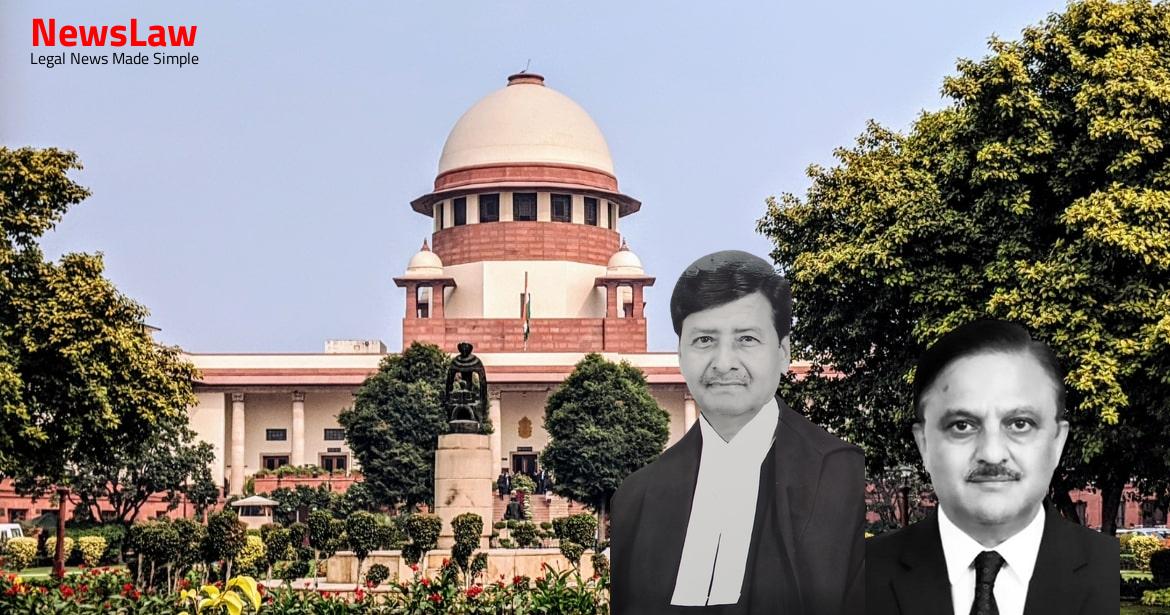Explore a case where the court’s meticulous legal analysis played a crucial role in determining the outcome of a land possession dispute. The court’s scrutiny of possession, notifications, and abatement under the Repeal Act offers valuable insights into the complexities of property law. Stay tuned to learn more about the legal nuances involved in this intriguing case.
Facts
- The Appellant executed a sale deed on 26.03.1994 to purchase 14 cents of land with an old house.
- The Competent Authority declared 0.57 acre and 0.71¾ acre as excess land in Survey No 53/3A and 53/3B2 respectively.
- The Competent Authority ordered surrender of 5,210.10 sq. mts. of land in Ullal village.
- Padmanabha filed a declaration under Section 6(1) of the Principal Act on 15.06.1984.
- The orders passed by the Competent Authority were challenged in court through various writ petitions.
- Competent Authority’s actions were scrutinized regarding possession, notifications, and abatement of proceedings under the Repeal Act.
- The Single Judge dismissed the writ petition of the Appellant solely because the partition deed dated 9.01.1984 was not provided to the Court.
Also Read: Curbing Frivolous Litigations: Judicial Analysis
Analysis
- The Division Bench observed that regardless of any partition after the Principal Act commenced, the land would still be subject to proceedings under the Act.
- The Appellant failed to establish acquisition of interest in the suit property before the Principal Act’s commencement or filing of the declaration.
- The Division Bench stated that the possession of the suit property is crucial for adjudicating the dispute effectively.
- It was necessary for the Division Bench to settle questions of fact such as the validity of the Appellant’s claim and possession of the property.
- The repealed Act specifies that if possession has not been taken, the order ceases to have an effect, allowing the person in possession to continue as the owner.
- Certain Sections of the Principal Act make it incumbent for the Competent Authority to give notice only to the ‘person concerned’ who filed the statement under Section 6.
- A notification was issued to consider claims of all other interested persons in the vacant land as per Section 10(1) of the Principal Act.
- Proceedings related to orders made under the principal Act before the commencement of this Act will abate.
- Exception for proceedings related to sections 11, 12, 13, and 14 of the principal Act if they are related to land possession taken over by the State Government or authorized person.
- Section 3(1)(a) of the Repeal Act provides a savings clause stating that the repeal will not affect the vesting of vacant land in the State Government if possession has been taken over by the concerned State Government.
- Section 3(2) specifies that vacant land vested in the State Government by the Principal Act, for which possession has not been taken over, shall be affected.
- The learned Single Judge has already given a definite factual finding on the Appellant’s ownership and possession of the suit property in the judgment dated 21.10.2003.
- It is not appropriate to remit the matter back to the learned Single Judge given the clear factual finding already established.
Also Read: Interpretation of Insurance Policy Provisions in Liability Determination
Decision
- The matter is remitted to the Division Bench of the Karnataka High Court for a fresh consideration.
- No costs are awarded in this matter.
- All questions of fact specified are to remain open for discussion.
- Parties are allowed to submit additional evidence that was not previously part of the case.
- The Division Bench is instructed to focus on the issue of possession of the suit property.
- Other original owners have accepted the Competent Authority’s orders except for the possession issue.
- The appeal is disposed of accordingly.
Also Read: Duty of Care in Bank Locker Operations
Case Title: U.A.BASHEER Vs. THE STATE OF KARNATAKA (2021 INSC 95)
Case Number: C.A. No.-003032-003032 / 2010



